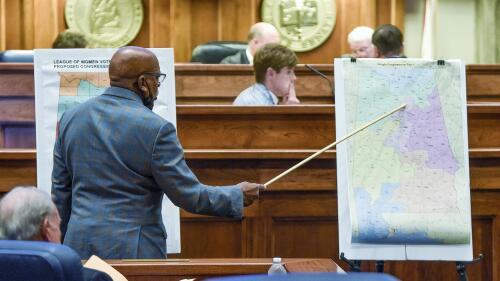BATON ROUGE, La. (AP) — Democratic Louisiana Gov. John Bel Edwards blocked a package of anti-LGBTQ+ legislation from becoming law Friday, including the state’s version of what critics call Florida’s “Don’t Say Gay” bill and a ban on gender-affirming medical care for young transgender people.
The effort by Republicans to enact the legislation into Louisiana law is likely far from over. Multiple GOP state lawmakers say they anticipate convening for a veto session mid-July in an attempt to override the governor’s decision.
Louisiana’s culture divide over LGBTQ+-related legislation echoes what has been seen in GOP-led statehouses across the country. Bills targeting transgender people have topped conservative agendas, and LGBTQ+ advocates say a dangerous and blatant attack is happening on their community. This year alone, more than 525 anti-LGBTQ+ bills were introduced in 41 states, according to data collected by the Human Rights Campaign, a gay rights organization.
A Louisiana woman who watched the man who coerced her into a sex act when she was 16 walk free in a plea deal has lost a legal battle to sue the prosecutor in the case.
The Supreme Court lifted its hold on a Louisiana case that could force the state to redraw congressional districts to boost Black voting power.

More changes could be coming to voting districts in some states. The 2022 elections marked the first using new districts for Congress and state capitols that were drawn from updated census data.
During the waning days of Louisiana’s legislative session, lawmakers passed a series of controversial bills: a ban on gender-affirming medical care for transgender minors that includes puberty-blockers, hormone treatment and surgery; a “Don’t Say Gay” bill that broadly bars teachers from discussing gender identity and sexual orientation in public school classrooms; and a measure requiring public school teachers to use the pronouns and names that align with what students were assigned at birth. Edwards vetoed all three bills.
Edwards — who is in his final six months of office, unable to seek reelection this year due to consecutive term limits — has repeatedly described the bills as wrong, divisive and targeting a vulnerable group of people.
State lawmakers will soon decide by majority vote whether they will return to the Capitol for a veto session, which would begin July 18. Although Louisiana has only held two such sessions since 1974, it seems increasingly realistic that one will occur this year. Multiple GOP lawmakers from both chambers have said they anticipate the gathering.
Once in special session, a two-thirds approval from both the House and Senate is needed to override the governor’s decision. Republicans currently hold a two-thirds majority in both chambers. Additionally, during the regular session, all three bills passed with more than a two-thirds vote — largely along party lines.
Marked by misinformation, religious arguments and hours of emotional testimony from the LGBTQ+ community, one of the most discussed bills was the ban on gender-affirming care — something that has been available in the United States for more than a decade and is endorsed by major medical associations. At one point, the bill was presumed dead after a veteran Republican lawmaker cast a tie-breaking vote to kill the bill. However, amid mounting pressure from Louisiana Attorney General Jeff Landry, who is a GOP gubernatorial frontrunner, and the Republican Party of Louisiana, the bill was resurrected and passed.
At least 20 states, including all three bordering Louisiana, have enacted laws restricting or banning gender-affirming medical care for transgender minors. Most of those states face lawsuits.
A federal judge struck down Arkansas’ ban as unconstitutional, and federal judges have temporarily blocked bans in Alabama, Indiana, Kentucky and Tennessee. Oklahoma has agreed to not enforce its ban while opponents seek a temporary court order blocking it. A federal judge has blocked Florida from enforcing its ban on three children who have challenged the law.
The Louisiana legislature also passed a bill broadly banning K-12 public school employees in Louisiana from discussing sexual orientation or gender identity in the classroom. It is similar to a law enacted in Florida last year that critics dubbed “Don’t Say Gay.” So far, three other states — Alabama, Arkansas and Iowa — have enacted similar laws, according to the Human Rights Campaign.
Additionally, lawmakers passed legislation requiring Louisiana public school teachers to use the pronouns and name that align what students were assigned at birth. Under the bill, a parent can give written consent for pronouns not consistent with the student’s sex assigned at birth to be used. A teacher can override the parent’s request “if doing so would violate the employee’s sincerely held religious beliefs.”
Republicans maintain that they are trying to protect children with these bills. Opponents argue it would do the opposite, leading to heightened risks of stress, depression and suicidal thoughts among an already vulnerable group.
#Louisiana #governor #vetoes #antiLGBTQ #legislation #including #genderaffirming #care #ban











Leave a Reply